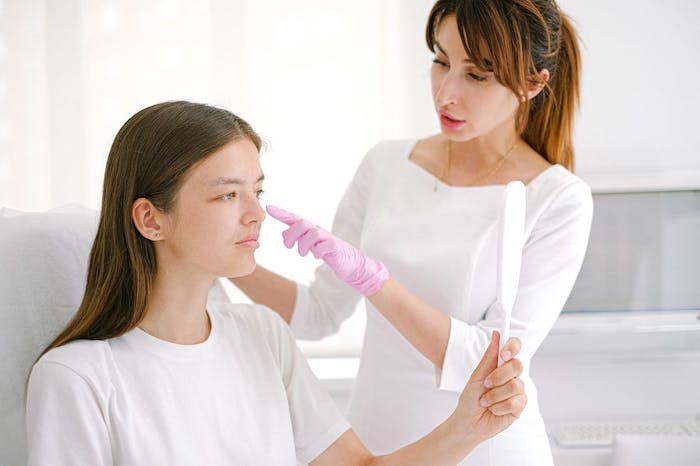Facial puffiness is a common issue that many of us face, particularly in the morning. Whether it’s due to fluid retention, sleep position, high sodium intake, or allergies, dealing with a puffy face can leave you feeling less than your best. However, there are steps you can take to address the causes of facial puffiness and reduce its appearance.
Causes of Morning Puffy Face
There are several factors that can contribute to a puffy face, including:
- Fluid retention: When fluids accumulate in facial tissues, especially after lying down for an extended period, it can lead to swelling.
- Sleep position: Sleeping on your back or stomach without proper elevation can worsen fluid retention in the face.
- High sodium intake: Consuming salty foods or drinks before bed can result in temporary water retention and puffiness.
- Alcohol consumption: Alcohol can dehydrate the body, leading to water retention and facial puffiness.
- Allergies: Seasonal allergies or sensitivities to certain substances can cause inflammation and swelling in the face.
- Hormonal changes: Hormonal fluctuations during pregnancy, menopause, or menstruation can cause water retention and puffiness.
- Lack of sleep: Poor sleep quality can increase stress and cortisol levels, leading to inflammation and puffiness in the face.
- Dehydration: Not drinking enough water can result in the body holding onto fluids, causing puffiness.
- Skin irritation or reactions: Using skincare products that irritate the skin or sleeping with makeup on can lead to swelling.
- Medical conditions: Persistent facial swelling may indicate underlying health issues such as hypothyroidism or kidney problems.
How to Reduce Puffy Face
If you’re dealing with a puffy face, here are some tips to help reduce its appearance:
- Adjust your sleeping position: Sleep with your head slightly elevated to promote fluid drainage from the face.
- Stay hydrated: Drink plenty of water throughout the day to maintain proper fluid balance in the body.
- Limit sodium and alcohol intake: Reduce consumption of salty foods and alcohol, especially before bed.
- Use a cold compress: Apply a cold compress or chilled cucumber slices to reduce swelling and tighten the skin.
- Try lymphatic drainage massage: Massage the face in upward and outward motions to promote fluid drainage.
- Incorporate anti-inflammatory foods into your diet: Include berries, leafy greens, turmeric, and omega-3-rich fish to help combat puffiness.
- Use cooling, anti-inflammatory skincare products: Look for products with ingredients like caffeine, green tea, or aloe vera to reduce swelling.
- Get enough sleep: Aim for 7-8 hours of quality sleep each night to reduce stress and inflammation.
- Address allergies: Identify and avoid triggers, and consider using over-the-counter antihistamines if needed.
By addressing the underlying causes of facial puffiness and implementing these tips, you can reduce swelling and achieve a more refreshed and rejuvenated appearance. Remember to listen to your body, stay hydrated, and prioritize self-care to keep your skin looking its best.
In the quest for clear, healthy skin, it’s essential to pay attention to the products you use and the environment you live in. Skincare products can either help or worsen skin issues, so it’s crucial to choose products with nourishing ingredients that won’t aggravate inflammation or puffiness. Look for products like our Calming Moisture, which is recommended by dermatologists for its ability to soothe skin inflammation, reduce puffiness, and restore a healthy skin barrier.
When selecting skincare and makeup products, always check the labels for irritating ingredients. Opt for products that are free of toxic and harsh chemicals to avoid any potential irritation. Our CV Skinlabs products are formulated without any harmful ingredients, providing a safe and gentle option for sensitive skin.
In addition to using the right skincare products, it’s important to take steps to improve your overall skin health. Consider using an air purifier to remove allergens from your indoor air, which can help reduce inflammation and puffiness. Regularly washing your bedding can also help prevent the buildup of irritants that can affect your skin.
Exercise is another key component of maintaining healthy skin. Physical activity improves blood circulation and reduces inflammation, both of which can help combat puffiness. Even light exercise, such as walking or yoga, can make a noticeable difference in the appearance of your skin.
If you’ve been struggling with a puffy face, incorporating these tips into your skincare routine can help improve your skin’s health and appearance. By choosing the right products, creating a healthy environment, and staying active, you can work towards achieving clear, radiant skin.
Remember, taking care of your skin is an ongoing process, so be consistent with your skincare routine and make adjustments as needed. With the right products and habits in place, you can achieve the glowing, healthy skin you desire.


